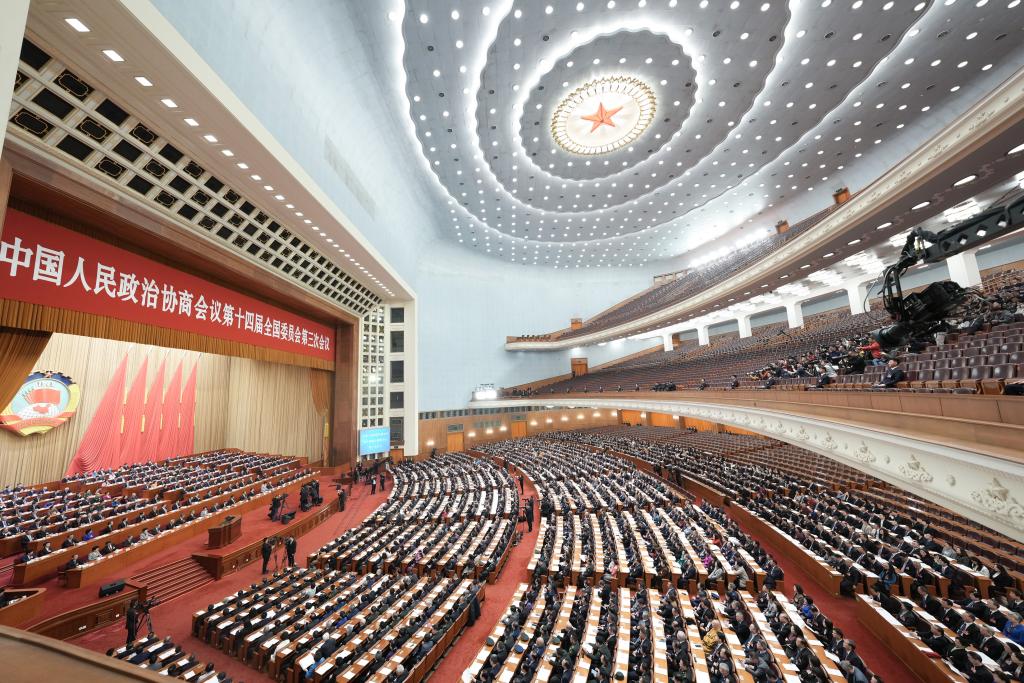
 0 Comment(s)
0 Comment(s) Print
Print E-mail China.org.cn, March 11, 2025
E-mail China.org.cn, March 11, 2025
The third plenary meeting of the third session of the 14th National Committee of the Chinese People's Political Consultative Conference (CPPCC) is held at the Great Hall of the People in Beijing, capital of China, March 9, 2025. [Photo/Xinhua]
National political advisors told China.org.cn during the third session of the 14th National Committee of the Chinese People's Political Consultative Conference (CPPCC) in Beijing that they are impressed by China's achievements during the 14th Five-Year Plan period. They praised the nation's ability to maintain stability amid global uncertainty while making significant advancements in high-tech development.
The year 2025 marks the conclusion of China's 14th Five-Year Plan (2021–2025) and serves as a pivotal moment for shaping the country's next five-year strategy. This year's government policies are expected to support economic stability and lay the groundwork for long-term modernization.
Qian Wenhui, a member of the 14th CPPCC National Committee and former chairman of the Agricultural Development Bank of China, called the past five years "remarkable," highlighting that China faced exceptional challenges, including the COVID-19 pandemic.
"We have largely overcome the pandemic, but its effects cannot be resolved in just a year or two. The financial difficulties encountered by many local governments today are closely linked to the challenges brought by the pandemic. Moreover, many issues and contradictions are deeply intertwined," he said. Qian added that in terms of the external environment, the central challenge remains the relationship between China and the United States.
"During the most challenging period of the pandemic, people's confidence in the future was often clouded by uncertainty," Qian said. "Amid China-U.S. tensions and relentless pressure from the Trump administration, many felt unsettled. But looking back now, we have overcome those difficulties and achieved hard-won progress. Moreover, the chaos in the West has further underscored China's stability and governance. People's expectations and confidence in the future have grown stronger, and this gain is greater than any other."
Liu Shangxi, former president of the Chinese Academy of Fiscal Sciences and a member of the 14th CPPCC National Committee, echoed this view.
"These past five years have been extraordinary," he said. "During this time, we've managed to establish certainty for China's development amid global uncertainty, which was no small feat. We have made it this far by skillfully navigating risks and challenges."
Liu noted that boosting consumption is a key objective for China during its industrial transformation.
"We need to balance supply and demand within the economic cycle," he said. "Macro policies should be more proactive and people-centered to address long-standing structural issues. Resolving these will improve economic circulation and strengthen growth momentum, though it will take time and require a concerted effort through both policy and reform."
Zhang Yi, another member of the 14th CPPCC National Committee, said China's progress in economic and social development over the past five years has been remarkable.
"Our ecological environment has significantly improved, our industrial structure has undergone important adjustments, and we've seen groundbreaking achievements in emerging industries, including technological breakthroughs. These are the aspects that have left a lasting impression on me," Zhang said.
Zhang pointed to artificial intelligence (AI) as a transformative force in traditional industries, reshaping production, upgrading industrial structures, and redefining underlying business logic to advance cognitive productivity.
"AI is a critical driver of high-quality development," he said. "However, challenges such as data ownership, copyright disputes, infringement, and the risks posed by deepfakes must be addressed. It's time to establish comprehensive AI legislation, consolidating existing policies and successful practices into a legal framework. This will promote innovation while ensuring orderly and standardized growth in the field."
The government has become more effective in formulating policies and driving economic and social development, according to Zhang. He cited a statement from this year's government work report, delivered by Premier Li Qiang on March 5.
The report said: "Policies should be introduced and implemented as soon as possible — it is better to act early than late, as this will buy valuable time to address any uncertainties that may arise. Once a policy is confirmed, we should act decisively and with ample force to achieve more effective outcomes."
"These pragmatic statements greatly boost the confidence of entrepreneurs," Zhang said. "Everyone is paying attention to the diversity, adequacy and timeliness of our policies. The premier's government work report made this clear, which has left a strong impression on everyone."
National political advisor and Newland Group CEO Wang Jing said China has made a historic leap in digital transformation over the past five years.
"What excites me most is China's strategy of building itself into a digital powerhouse," Wang said. "It has propelled cutting-edge technologies such as AI and big data from 'following' to 'running alongside' Western tech leaders and even 'leading' the way globally."
Wang noted China's strong technological resilience in social governance and industrial upgrading. She attributed this progress to the integration of the Communist Party of China Central Committee's people-centered development philosophy and the strategy of self-reliance in science and technology, highlighting the advantages of China's socialist system.
Wang expects that China will unleash the multiplier effect of institutional and technological dividends in the digital era during the 15th Five-Year Plan period. She envisions China accelerating an independent digital technology system, advancing AI large models and computing infrastructure, and strengthening digital sovereignty.
Wang said the country should promote AI's practical application in rural revitalization, public services and green development, making technology more human-centered.
She also suggested strengthening digital ethics and security governance to build an inclusive ecosystem, ensuring that China's digital initiatives become engines for high-quality development and beacons for human progress.